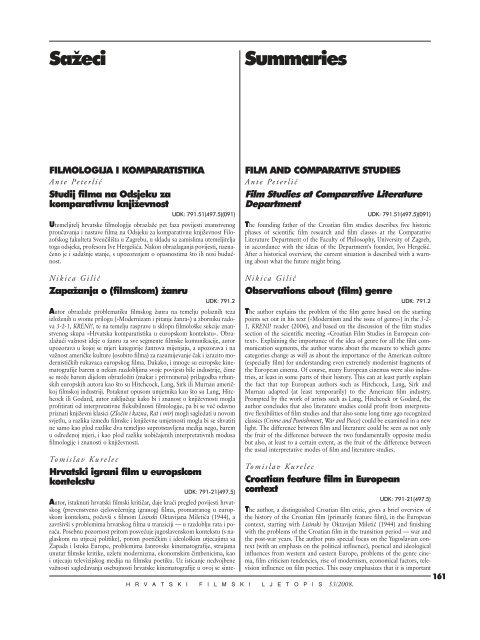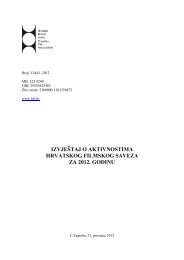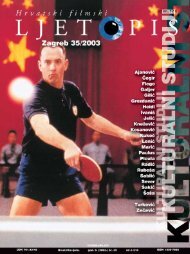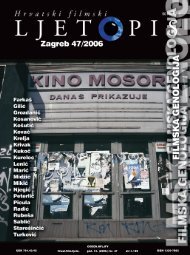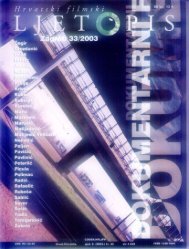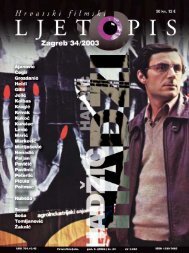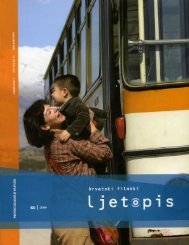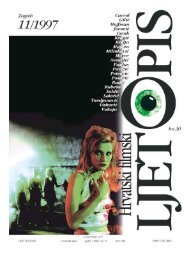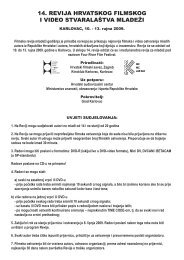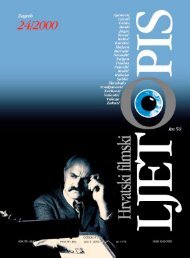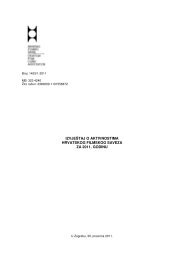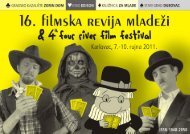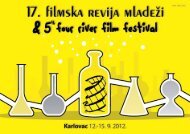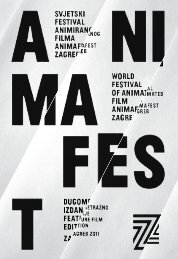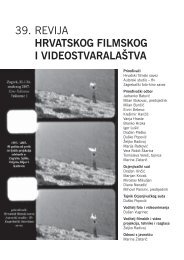Create successful ePaper yourself
Turn your PDF publications into a flip-book with our unique Google optimized e-Paper software.
hfl_<strong>53</strong>.qxp <strong>2008</strong>-04-18 11:08 Page 161<br />
Sa`eci<br />
Summaries<br />
FILMOLOGIJA I KOMPARATISTIKA<br />
Ante Peterli}<br />
Studij filma na Odsjeku za<br />
komparativnu knji`evnost<br />
UDK: 791.51(497.5)(091)<br />
Utemeljitelj hrvatske filmologije obrazla`e pet faza povijesti znanstvenog<br />
prou~avanja i nastave filma na Odsjeku za komparativnu knji`evnost Filozofskog<br />
fakulteta Sveu~ili{ta u Zagrebu, u skladu sa zamislima utemeljitelja<br />
toga odsjeka, profesora Ive Herge{i}a. Nakon obrazlaganja povijesti, nazna-<br />
~eno je i sada{nje stanje, s upozorenjem o opasnostima {to ih nosi budu}-<br />
nost.<br />
FILM AND COMPARATIVE STUDIES<br />
Ante Peterli}<br />
Film Studies at Comparative Literature<br />
Department<br />
UDK: 791.51(497.5)(091)<br />
The founding father of the Croatian film studies describes five historic<br />
phases of scientific film research and film classes at the Comparative<br />
Literature Department of the Faculty of Philosophy, University of Zagreb,<br />
in accordance with the ideas of the Department's founder, Ivo Herge{i}.<br />
After a historical overview, the current situation is described with a warning<br />
about what the future might bring.<br />
Nikica Gili}<br />
Zapa`anja o (filmskom) `anru<br />
UDK: 791.2<br />
Autor obrazla`e problematiku filmskog `anra na temelju polaznih teza<br />
izlo`enih u svome prilogu (»Modernizam i pitanje `anra«) u zborniku radova<br />
3-2-1, KRENI!, te na temelju rasprave u sklopu filmolo{ke sekcije znanstvenog<br />
skupa »Hrvatska komparatistika u europskom kontekstu«. Obrazla`u}i<br />
va`nost ideje o `anru za sve segmente filmske komunikacije, autor<br />
upozorava u kojoj se mjeri kategorije `anrova mijenjaju, a upozorava i na<br />
va`nost ameri~ke kulture (osobito filma) za razumijevanje ~ak i izrazito modernisti~kih<br />
rukavaca europskog filma. Dakako, i mnoge su europske kinematografije<br />
barem u nekim razdobljima svoje povijesti bile industrije, ~ime<br />
se mo`e barem dijelom obrazlo`iti (makar i privremena) prilagodba vrhunskih<br />
europskih autora kao {to su Hitchcock, Lang, Sirk ili Murnau ameri~koj<br />
filmskoj industriji. Potaknut opusom umjetnika kao {to su Lang, Hitchcock<br />
ili Godard, autor zaklju~uje kako bi i znanost o knji`evnosti mogla<br />
profitirati od interpretativne fleksibilnosti filmologije, pa bi se ve} odavno<br />
priznati knji`evni klasici (Zlo~in i kazna, Rat i mir) mogli sagledati u novom<br />
svjetlu, a razlika izme|u filmske i knji`evne umjetnosti mogla bi se shvatiti<br />
ne samo kao plod razlike dva temeljno suprotstavljena medija nego, barem<br />
u odre|enoj mjeri, i kao plod razlike uobi~ajenih interpretativnih modusa<br />
filmologije i znanosti o knji`evnosti.<br />
Tomislav Kurelec<br />
Hrvatski igrani film u europskom<br />
kontekstu<br />
UDK: 791-21(497.5)<br />
Autor, istaknuti hrvatski filmski kriti~ar, daje kra}i pregled povijesti hrvatskog<br />
(prevenstveno cjelove~ernjeg igranog) filma, promatranog u europskom<br />
kontekstu, po~ev{i s filmom Lisinski Oktavijana Mileti}a (1944), a<br />
zavr{iv{i s problemima hrvatskog filma u tranziciji — u razdoblju rata i pora}a.<br />
Posebnu pozornost pritom posve}uje jugoslavenskom kontekstu (s naglaskom<br />
na utjecaj politike), potom poeti~kim i ideolo{kim utjecajima sa<br />
Zapada i Istoka Europe, problemima `anrovske kinematografije, strujama<br />
unutar filmske kritike, uzletu modernizma, ekonomskim ~imbenicima, kao<br />
i utjecaju televizijskog medija na filmsku poetiku. Uz isticanje nedvojbene<br />
va`nosti sagledavanja osebujnosti hrvatske kinematografije u ovoj se sinte-<br />
Nikica Gili}<br />
Observations about (film) genre<br />
UDK: 791.2<br />
The author explains the problem of the film genre based on the starting<br />
points set out in his text (»Modernism and the issue of genre«) in the 3-2-<br />
1, KRENI! reader (2006), and based on the discussion of the film studies<br />
section of the scientific meeting »Croatian Film Studies in European context«.<br />
Explaining the importance of the idea of genre for all the film communication<br />
segments, the author warns about the measure to which genre<br />
categories change as well as about the importance of the American culture<br />
(especially film) for understanding even extremely modernist fragments of<br />
the European cinema. Of course, many European cinemas were also industries,<br />
at least in some parts of their history. This can at least partly explain<br />
the fact that top European authors such as Hitchcock, Lang, Sirk and<br />
Murnau adapted (at least temporarily) to the American film industry.<br />
Prompted by the work of artists such as Lang, Hitchcock or Godard, the<br />
author concludes that also literature studies could profit from interpretative<br />
flexibilities of film studies and that also some long time ago recognized<br />
classics (Crime and Punishment, War and Piece) could be examined in a new<br />
light. The difference between film and literature could be seen as not only<br />
the fruit of the difference between the two fundamentally opposite media<br />
but also, at least to a certain extent, as the fruit of the difference between<br />
the usual interpretative modes of film and literature studies.<br />
Tomislav Kurelec<br />
Croatian feature film in European<br />
context<br />
UDK: 791-21(497.5)<br />
The author, a distinguished Croatian film critic, gives a brief overview of<br />
the history of the Croatian film (primarily feature film), in the European<br />
context, starting with Lisinski by Oktavijan Mileti} (1944) and finishing<br />
with the problems of the Croatian film in the transition period — war and<br />
the post-war years. The author puts special focus on the Yugoslavian context<br />
(with an emphasis on the political influence), poetical and ideological<br />
influences from western and eastern Europe, problems of the genre cinema,<br />
film criticism tendencies, rise of modernism, economical factors, television<br />
influence on film poetics. This essay emphasizes that it is important<br />
161<br />
H R V A T S K I F I L M S K I L J E T O P I S <strong>53</strong>/<strong>2008</strong>.


